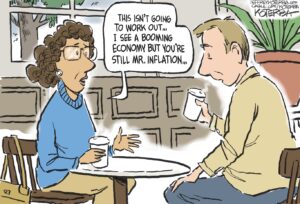A Glimpse Into the Heart of a Rotten System
I have now sat through Charles Ferguson’s “Inside Job”— the nonfiction version of Oliver Stone’s “Wall Street: Money Never Sleeps”— and I still don’t fully understand our endless financial crisis This does not mean that “Inside Job” is a failureI have now sat through Charles Ferguson’s documentary and I still don’t fully understand our endless financial crisis.
All right—I give up. I have now sat through Charles Ferguson’s “Inside Job”—the nonfiction version of Oliver Stone’s “Wall Street: Money Never Sleeps”—and I still don’t fully understand our endless financial crisis. Nor do I think the fault is entirely my own. I was upright, alert and taking notes like any Econ. 101 student, and yet I cannot tell you how a credit default swap works or why it is inherently bad for us.
This does not mean that “Inside Job” is a failure. There is, curiously enough, something hypnotic about middle-aged men in suits earnestly explaining how the economy went from bad to worse to terrible a couple of years ago. The film offers us a few admirable guys who issued unheeded warnings about the fragility of the system and a lot more of them who pretty much function as gawkers observing a multi-car crash. I suppose the documentary suffers somewhat from the refusal of the crisis’ big names—Geithner, Bernanke, et al.—to sit for Ferguson’s cameras, but that’s not fatal; unknowns can simultaneously obfuscate and illuminate the story as well as anyone else. Indeed, it seems to me that in some ways they explore the depth of American crookedness better than the Big Names might have done.
What I’m referring to here is a little subplot that Ferguson almost tosses off. He’s interviewing a Columbia Business School professor and former Federal Reserve governor named Frederic Mishkin, who in 2006 was paid $124,000 by the Icelandic Chamber of Commerce to write a suck-up report on that country’s financial sector. This was not long before Iceland’s economy went belly-up, prefiguring the much larger crisis that soon followed. Mishkin was not alone in this submoral activity, but he is the one who goes all snarky about it on camera — regretting his agreement to do the interview in the first place, then bringing it to an angry and abrupt end.
Well, of course, this is the kind of moment documentarians live for and rarely obtain (and how Ferguson got his subject’s release to use the footage is something I’d love to know). But that’s not my point. The ethics of the situation are utterly clear-cut. As a movie reviewer for more than four decades, I never even thought about the need to stay arm’s length from the studios and filmmakers whose works I was observing. OK, I might occasionally scarf up some buffet food after a screening. And when, as sometimes happened, I befriended a director, it was understood that I would recuse myself from commenting on his work. To do otherwise would have been a firing offense. And it seems to me that ought to be in the case of someone like Mishkin, whose fee, incidentally, exceeds all but one of the advances I ever received for writing a book. Putting this point simply, an academic ought to be a policeman in situations of this kind—and be held to an ethical standard at least as high as the one applied to a humble journalist.
But the man does serve Ferguson’s higher purpose: He illustrates just how deep the rot in the system went, which is the most important point his documentary makes. Somehow, the financial collapse has up to now drained away $20 trillion of the world’s wealth and, as he says in a statement contained in his film’s production notes, nobody has gone to prison as a result of this truly spectacular meltdown, which he also suggests could be—probably will be—replicated sometime in the not-too-distant future.
Ferguson is clearly outraged by what he has learned about our current situation, and you can feel him struggling to maintain his reportorial objectivity. The sometimes droning tone of “Inside Job” attests to his largely successful efforts in that regard. That, however, does not prevent us from emerging from it pissed off. As a matter of fact, it may finally work in the film’s favor that most of the major players in this disaster clammed up when Ferguson came calling. We are at least spared their sweaty and useless rationales for their morally hazardous behavior.
In Oliver Stone’s lackluster sequel, Gordon Gekko observes that greed is no longer merely good, it’s legal, a fact of life that seems to appall even that cheerful amoralist. I don’t know that we have a pressing need for yet another film that drives that point home again. But the filmmaker’s essential sobriety, his earnest effort to unravel a tangled skein of misdeeds—especially his insistence that the free and easy passage between Wall Street and Washington by the architects of this disaster—is a worthwhile activity. Me, I’d rather see the forthcoming “Reds,” which is the best and wittiest commercial movie of the year. But still, I’m more than happy to have seen “Inside Job”—if only to watch professor Mishkin prove the intrinsic and almost universal shabbiness of our times.
Your support matters…Independent journalism is under threat and overshadowed by heavily funded mainstream media.
You can help level the playing field. Become a member.
Your tax-deductible contribution keeps us digging beneath the headlines to give you thought-provoking, investigative reporting and analysis that unearths what's really happening- without compromise.
Give today to support our courageous, independent journalists.






You need to be a supporter to comment.
There are currently no responses to this article.
Be the first to respond.